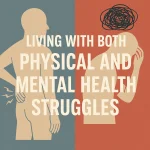When we talk about mental health, we often separate it from physical health. The truth is, for many of us, the two are deeply linked. Living with long-term physical conditions can weigh heavily on the mind, while mental health struggles can make physical pain even harder to bear. I want to share my own reality, not for pity, but because many of you will recognise parts of this journey in your own lives.
On top of that, I have knee problems that make mobility even tougher. My kneecaps don’t sit in the groove they’re supposed to, and the supporting ligaments are damaged. They never quite feel stable, which makes moving around a challenge.
There’s also a small curve in my spine, enough to cause hunching and add to the pain in my back. Then there are my heart conditions: a bicuspid valve and ventricular tachycardia. These aren’t just words on a medical report — they bring the constant awareness that my heart isn’t working the way it should, and that’s a heavy thing to carry around.
There’s also the possibility of bipolar disorder — still not fully confirmed — which means my moods can swing from one extreme to another, leaving me trying to keep my balance when the ground underneath feels unstable.
And yet, life doesn’t stop. There are children to raise, responsibilities to handle, and communities to build. I’ve learned that resilience isn’t about pretending everything is fine. It’s about carrying what you can, admitting when you can’t, and finding ways to keep going even when everything feels too much.
If you’re here on Trapped Minds, you don’t have to carry it all in silence. Talk, vent, connect. Sometimes the strongest thing you can do is admit how hard it really is.
The Physical Side
Every day I live with a degenerative muscle issue in my lower back. That means constant pain — not just in my back, but shooting down my legs too. Simple things like standing, walking, or sitting for too long quickly turn into battles with pain.On top of that, I have knee problems that make mobility even tougher. My kneecaps don’t sit in the groove they’re supposed to, and the supporting ligaments are damaged. They never quite feel stable, which makes moving around a challenge.
There’s also a small curve in my spine, enough to cause hunching and add to the pain in my back. Then there are my heart conditions: a bicuspid valve and ventricular tachycardia. These aren’t just words on a medical report — they bring the constant awareness that my heart isn’t working the way it should, and that’s a heavy thing to carry around.
The Mental Side
If that was all I had to deal with, it would already be a lot. But alongside the physical conditions, I live with mental health struggles too. Depression has been a long-standing companion, weighing me down and making motivation hard to find. Anxiety is another constant, often overwhelming, with panic attacks that can strike hard and fast.There’s also the possibility of bipolar disorder — still not fully confirmed — which means my moods can swing from one extreme to another, leaving me trying to keep my balance when the ground underneath feels unstable.
The Reality
Put all of this together and you get the reality: constant pain, unpredictable health, and mental battles that never fully switch off. It can feel like a war on two fronts — the body and the mind. Some days, just getting through is an achievement.And yet, life doesn’t stop. There are children to raise, responsibilities to handle, and communities to build. I’ve learned that resilience isn’t about pretending everything is fine. It’s about carrying what you can, admitting when you can’t, and finding ways to keep going even when everything feels too much.
Why Share This?
Because if you’re living with your own combination of physical pain and mental health struggles, I want you to know you’re not alone. You might not have the exact same diagnoses, but the daily fight, the exhaustion, the feeling of being misunderstood — that’s something many of us share.If you’re here on Trapped Minds, you don’t have to carry it all in silence. Talk, vent, connect. Sometimes the strongest thing you can do is admit how hard it really is.


